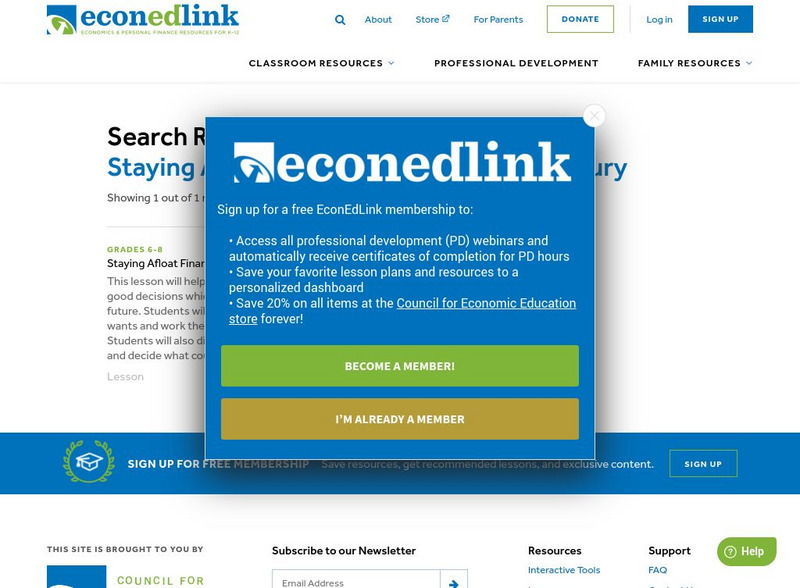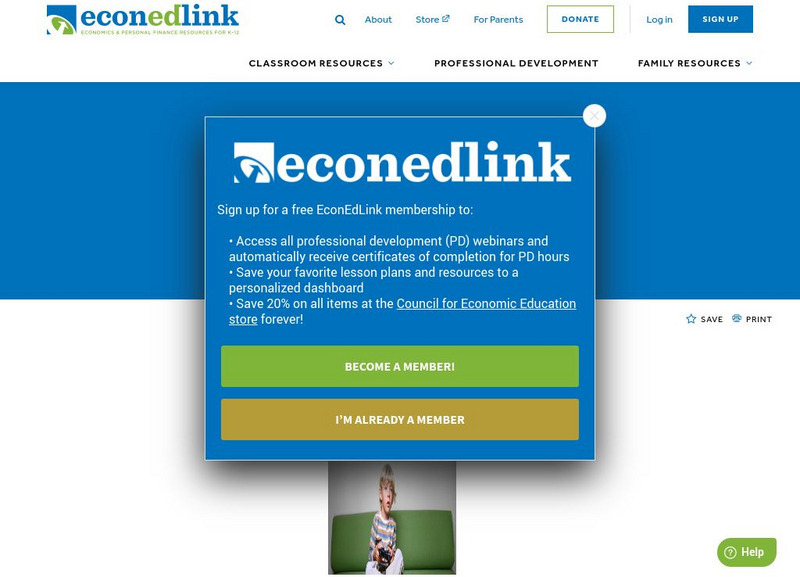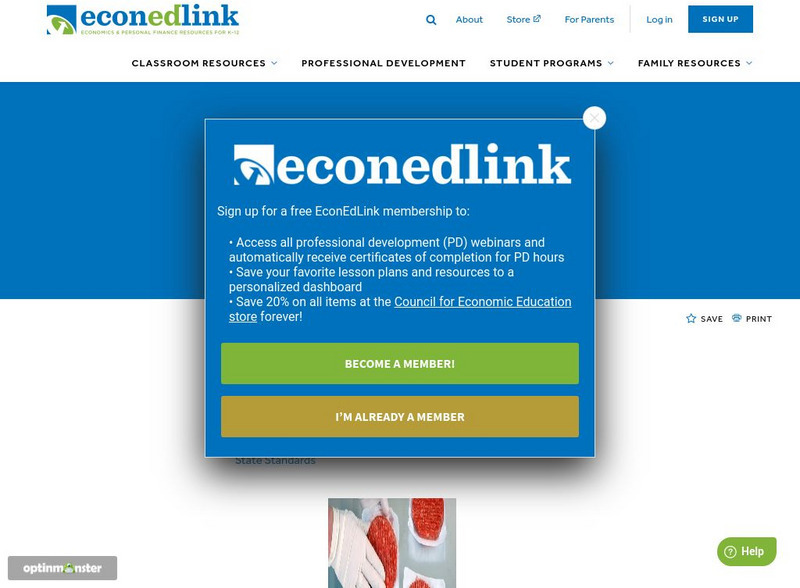Hi, what do you want to do?
Federal Reserve Bank
Federal Reserve Bank of Minneapolis: Why Johnny Can't Choose
If you don't know what the economy is or how it works, this site is for you. It is broken into subsections that make it easy to understand the economy.
Council for Economic Education
Econ Ed Link: Sand Art Brownies
In this lesson, you will learn about substitute goods. You will have choices to make in your role as a shopper. In making these choices, you will decide whether you are willing to accept one good as a substitute for another or not. Are...
Council for Economic Education
Econ Ed Link: Satisfaction Please! (Part I)
Even the savviest consumer has a problem with a good or service on occasion. It is a consumer's right to complain when there is a genuine problem. In some situations, it is also a consumer's responsibility. A problem can't be fixed if no...
Council for Economic Education
Econ Ed Link: It's a Matter of Power
Students examine tradeoffs and profit- maximization decisions in the case study of Kaiser Aluminum, which decided to shut down aluminum production in favor of reselling electricity.
Council for Economic Education
Econ Ed Link: Utility
Can happiness be measured? Learners will learn how utility relates to economic decision making and the law of diminishing marginal utility.
Council for Economic Education
Econ Ed Link: Population Growth: Friend or Foe?
The environment has recently been the focus of much research and discussion. Because productive resources are limited, it is important that we use resources wisely to ensure that resources will be available for use in future generations....
Council for Economic Education
Econ Ed Link: Staying Afloat Financially in the 21st Century
This instructional activity will help students identify how to make good decisions which will help them financially in the future. Students will identify how to take their own wants and work them into a form of a personal budget....
Council for Economic Education
Econ Ed Link: Is Globalization a Dirty Word?
Is globalization a dirty word? Well not according to a recent study conducted by the World Bank. The report, entitled Globalization, Growth, and Poverty: Building an Inclusive World Economy, makes the case for globalization as a method...
Council for Economic Education
Econ Ed Link: You Decide!
Think about a difficult decision you have had to make. After you decided did it work out? Why or why not? Why do you think decisions and choices are hard to make? We make personal decisions and we make decisions as groups. There is a...
Council for Economic Education
Econ Ed Link: Dynamic Decision Making
Students will be introduced to the PACED Model and learn to use the parts of the model-- Problem, Alternatives, Criteria, and Evaluation- in solving problems and making decisions. They will practice using the model in decisions about...
Council for Economic Education
Econ Ed Link: Why Cities Provide Tax Breaks
Like the state and federal government, local governments offer tax incentives to businesses to help solve economic and/or environmental problems. In this lesson, young scholars will explore three different cities and determine what...
Council for Economic Education
Econ Ed Link: President Obama's Allowance
In this lesson, students will identify different expenses in the US budget and will decide on the order of importance for different expenses.
Council for Economic Education
Econ Ed Link: National Parks: Only You Can Prevent the Coming Crisis
What do you think of when you think of the National Parks System? Do you think of the majesty of the Grand Canyon and the redwoods of Northern California? Or does the serenity of Cape Cod and the Everglades come to mind?
Council for Economic Education
Econ Ed Link: Guess Who's Coming to Dinner
This lesson plan introduces regulation and information as two tools used by government to promote fair competition and complete information in a market economy. Using the 1906 Pure Food and Drugs Act as a case study, students explore the...
Khan Academy
Khan Academy: The Confusion Over Inflation
Why do people worry about inflation? What are the economic effects of inflation?.
Curated OER
Market Failure; Positive Externalities
This site examines how society can benefit by producing and consuming more of a product that causes a positive externality.
Council for Economic Education
Econ Ed Link: The Mystery of the Voters Who Don't Vote
This lesson plan from the Council for Economic Education for students, grades 9-12, examines the question of why many Americans don't vote. It interestingly ties the answer to some economic terms such as choice, cost/benefit analysis,...
Council for Economic Education
Econ Ed Link: Be All You Can Be for Minimum Wage? (Student Page)
This lesson ask students to calculate the percentage change in military strength over the last two decades, hypothesize economic (and non-economic) explanations for these changes, test hypothetical explanations by reading an economic...
Council for Economic Education
Econ Ed Link: New Sense, Inc. Vs. Fish 'Till U Drop or Coase vs. Pigou
Hot debate and arguments galore whirl around this question: "Which economic approach is the most efficient and fair to resolve utility issues surrounding the use of common or public property?" This lesson will explore, examine and...
Council for Economic Education
Econ Ed Link: You Can Bank on This! (Part 2)
As in the first ', You Can BANK on This, you will learn that banking should not be confusing - it should be INTERESTING! Lesson Two will continue learning with Zing, but this time we will learn all about budgeting - and budgeting means...
Council for Economic Education
Econ Ed Link: The Credit Card Mystery
Credit Cards are a risky business these days, especially for learners and those holding multiple cards. Interest rates on credit card balances have always been high relative to other rates, for several reasons. Despite this, there is...
Council for Economic Education
Econ Ed Link: Nafta: Are Jobs Being Sucked Out of the United States?
NAFTA, the North American Free Trade Agreement, went into effect on January 1, 1994. The Agreement phases out most tariffs between the United States, Canada, and Mexico. Tariffs, which are taxes on imports, increase the price of foreign...
Council for Economic Education
Econ Ed Link: All in Business
This lesson on entrepreneurship can be used to help students understand what innovations are, and what it takes to get an idea off the ground. This lesson will take students through the process of calculating risks associated with...
Council for Economic Education
Econ Ed Link: Business Ownership: The Franchise Option
Young scholars explore an alternative to starting a business from scratch- investing in a franchise. They begin by considering the pros and cons of a franchise and whether this form of business is an option that would fit their...













